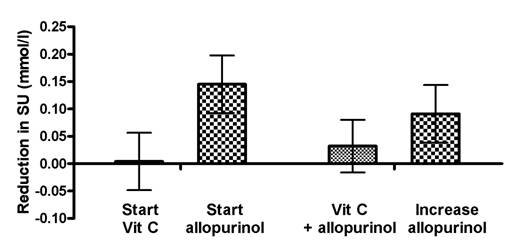Session Information
Session Type: Abstract Submissions (ACR)
Results: 18/20 patients who received Vitamin C were male with a mean age of 61.2 years (39-86). 18/20 patients who did not receive vitamin C were male with mean age of 55.0years (27-78). There was no significant difference in baseline SU or eGFR between those who received vitamin C and those who did not (SU 0.50 ±0.11mmol/l vs. 0.50 ± 0.09mmol/l p=0.89; eGFR 65.5 ± 15.7 vs. 67.9 ± 20.7 p=0.67). 30% in the vitamin C group were receiving diuretics compared to 25% in the no vitamin C group (p=0.72).
In the 20 patients receiving supplemental vitamin C there was a significant increase between week 0 and week 8 in plasma ascorbate (34.2µmol/l; p<0.001). There was no significant change in plasma ascorbate in those who did not receive vitamin C. The reduction in SU was significantly less in those 20 patients receiving vitamin C compared to those who started or increased the dose of allopurinol (0.014mmol/l vs. 0.118mmol/l p<0.001) (Figure). Allowing for eGFR did not affect these results.
Since Vitamin C is uricosuric we assessed change in urinary urate excretion using the Simkin index. In those patients already receiving allopurinol, addition of Vitamin C or an increase in allopurinol dose had no effect. In contrast, in those patients starting allopurinol there was a significant reduction in the Simkin index compared to those starting vitamin C (-0.13 vs. 0.002 p<0.011).
Conclusion: In this study supplemental vitamin C at modest dose (500mg/d) for 8 weeks had no significant urate lowering effect in patients with gout despite increasing plasma ascorbate concentrations. These results differ from findings in hyperuricaemic healthy controls. The uricosuric effect of modest dose vitamin C appears less in patients with gout both as monotherapy and in combination with allopurinol. Whether larger doses will be effective remains to be determined.
Figure: Effect of vitamin C and allopurinol on serum urate
Disclosure:
L. K. Stamp,
None;
C. Frampton,
None;
J. L. O’Donnell,
None;
J. Drake,
None;
P. T. Chapman,
None.
« Back to 2012 ACR/ARHP Annual Meeting
ACR Meeting Abstracts - https://acrabstracts.org/abstract/lack-of-effect-of-supplemental-vitamin-c-on-serum-urate-in-patients-with-gout/

